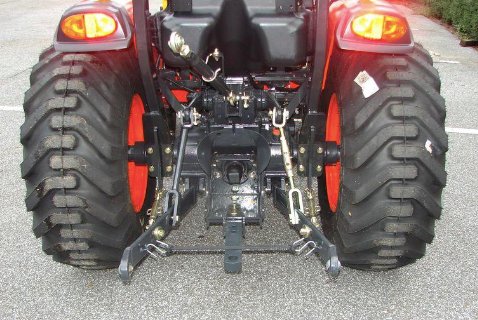Kioti tractors are renowned for their reliability and versatility, with the 3-point hitch system playing a crucial role in their functionality. However, like any mechanical component, these hitches can encounter issues over time. This comprehensive guide will walk you through common Kioti 3-point hitch problems, their causes, and effective solutions to keep your tractor operating at peak performance.
Understanding the Kioti 3-Point Hitch System
Before diving into troubleshooting, it’s essential to understand the basics of the Kioti 3-point hitch system. This mechanism consists of three connection points between the tractor and implements, allowing for easy attachment and detachment of various farming tools. The system includes:
- Top link
- Two lower lift arms
- Hydraulic lift system
- Stabilizers or sway bars
Here’s a quick overview of common issues and their primary causes:
| Problem | Primary Cause | Quick Fix |
|---|---|---|
| Hitch not lifting | Low hydraulic fluid | Check and refill hydraulic oil |
| Uneven lifting | Misaligned lift arms | Adjust lift arm lengths |
| Excessive sway | Loose or worn stabilizers | Tighten or replace stabilizers |
| Difficulty attaching implements | Bent or damaged hitch points | Inspect and repair/replace damaged components |
| Slow response | Clogged hydraulic filter | Clean or replace the hydraulic filter |
Common Kioti 3-Point Hitch Problems and Solutions
Hydraulic System Issues
The hydraulic system is the heart of the 3-point hitch operation. Problems in this area can significantly impact your tractor’s performance.
Low Hydraulic Fluid
Symptoms: Slow or unresponsive lift, unusual noises from the hydraulic pump.
Solution: Check the hydraulic fluid level and top up if necessary. Use the manufacturer-recommended oil type and ensure the system is free from leaks.
Contaminated Hydraulic Oil
Symptoms: Jerky movements, reduced lifting capacity.
Solution: Drain the old oil, flush the system, and refill with fresh hydraulic fluid. Replace the hydraulic filter to prevent future contamination.
Mechanical Problems
Mechanical issues often arise from wear and tear or improper maintenance.
Misaligned Lift Arms
Symptoms: Uneven lifting of implements, difficulty in attaching equipment.
Solution: Adjust the lift arm lengths according to the Kioti manual specifications. Ensure both arms are of equal length for balanced lifting.
Worn or Damaged Hitch Points
Symptoms: Excessive play in attachments, difficulty in securing implements.
Solution: Inspect all connection points for wear or damage. Replace any bent or worn components, including pins and bushings.
Electrical System Faults
Modern Kioti tractors incorporate electronic controls for the 3-point hitch system.
Faulty Position Control Sensor
Symptoms: Erratic lifting behavior, hitch not responding to controls.
Solution: Check the wiring connections to the position control sensor. If issues persist, the sensor may need replacement by a qualified technician.
Control Panel Malfunctions
Symptoms: Unresponsive controls, error messages on the display.
Solution: Consult the Kioti manual for error code interpretations. Some issues may be resolved by resetting the system, while others might require professional diagnosis.
Preventive Maintenance for Kioti 3-Point Hitches
Regular maintenance is key to preventing many common 3-point hitch problems. Here are some essential maintenance tasks:
- Lubricate all moving parts: Apply grease to fittings on lift arms, top link, and stabilizers regularly.
- Check hydraulic connections: Inspect hoses and fittings for leaks or damage.
- Clean the hitch system: Remove dirt and debris, especially around pivot points and hydraulic components.
- Inspect for wear: Regularly check all pins, bushings, and connection points for signs of wear.
- Maintain proper hydraulic fluid levels: Check and top up hydraulic oil as needed, following Kioti’s recommendations.
Advanced Troubleshooting Techniques
For more complex issues, consider these advanced troubleshooting methods:
Pressure Testing
If you suspect hydraulic system problems, conducting a pressure test can provide valuable insights. This test measures the system’s operating pressure and can help identify issues like worn pumps or faulty relief valves.
Electronic Diagnostics
For tractors with electronic hitch control systems, using a diagnostic tool can help pinpoint electrical issues. These tools can read error codes and provide detailed information about system performance.
Implement Compatibility Check
Sometimes, problems arise not from the hitch itself but from incompatible implements. Always ensure that the equipment you’re using is suitable for your Kioti model’s specifications.
When to Seek Professional Help
While many issues can be resolved with DIY methods, some problems require expert intervention. Consider contacting a Kioti-certified technician if:
- You encounter persistent hydraulic system issues
- There are signs of internal mechanical damage
- Electrical problems continue after basic troubleshooting
- You’re unsure about performing complex repairs or adjustments
Professional technicians have the tools and expertise to diagnose and fix complex issues safely and efficiently.
Conclusion
Mastering the art of troubleshooting your Kioti 3-point hitch can save you time and money while ensuring your tractor remains a reliable workhorse on your farm. By understanding common problems, implementing regular maintenance, and knowing when to seek professional help, you can keep your Kioti tractor operating at its best for years to come.
Remember, prevention is always better than cure. Regular inspections and timely maintenance can prevent many issues before they become serious problems. With proper care and attention, your Kioti 3-point hitch will continue to be a dependable tool for all your farming needs.
FAQs
How often should I lubricate my Kioti 3-point hitch?
Lubricate all moving parts every 50 hours of operation or weekly, whichever comes first.
Can I use any hydraulic fluid in my Kioti tractor?
No, use only the hydraulic fluid type specified in your Kioti tractor’s manual to ensure optimal performance and longevity.
Why is my 3-point hitch lifting unevenly?
Uneven lifting is often caused by misaligned lift arms. Adjust the arm lengths to ensure they are equal.
How do I know if my hydraulic pump is failing?
Signs include slow lifting, unusual noises, and reduced lifting capacity. A pressure test can confirm pump issues.
Is it normal for the 3-point hitch to drift down slowly when raised?
A slight drift can be normal, but excessive lowering may indicate worn seals in the hydraulic system requiring repair.
